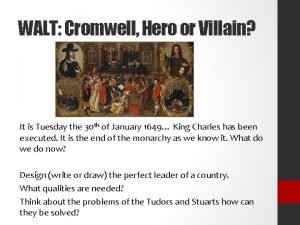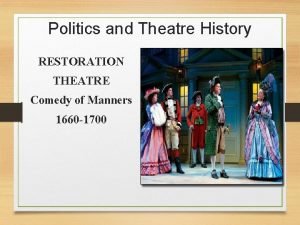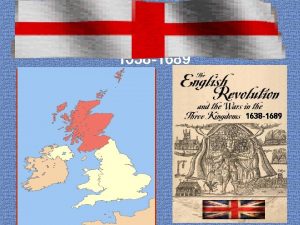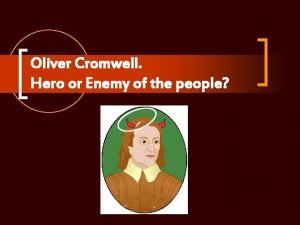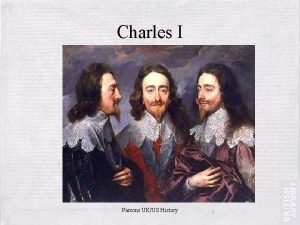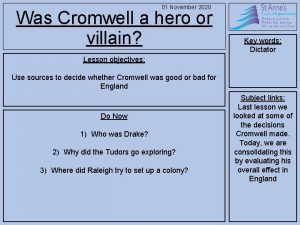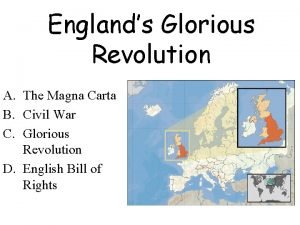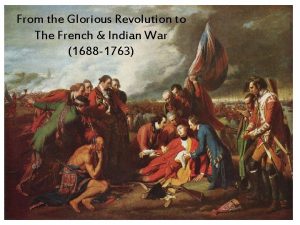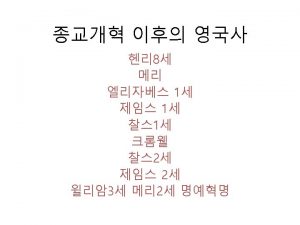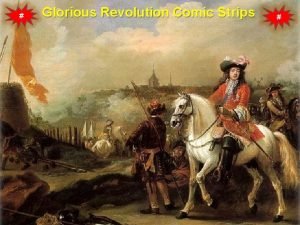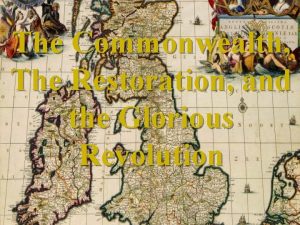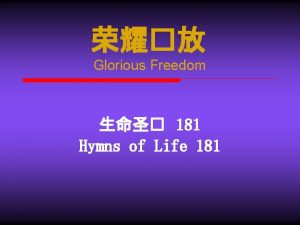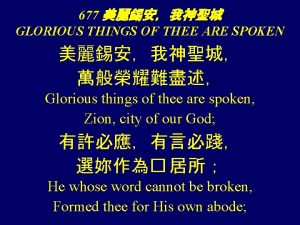The Commonwealth the Glorious Revolution Oliver Cromwell Oliver











- Slides: 11

The Commonwealth & the Glorious Revolution

Oliver Cromwell

Oliver Cromwell as Lord Protector Cromwell (a Puritan) ruled England for 5 years as a dictator (not a monarch because he was not of royal blood). The monarchy had been abolished; England was known as a Commonwealth Cromwell was given the title “Lord Protector. ” Protector Cromwell ruled through the army He enforced his laws with military action Conquered Scotland & Ireland. Wanted educated Protestants; Protestants boys and girls started school.

Cromwell as Lord Protector cont… Cromwell and the Puritan Parliament enacted many strict religious based laws: Sunday was strictly for religious observance only Cromwell closed all theaters, outlawed profanity, and frowned on dancing, gambling, and taverns. Pushed for marriages of love, love not just business. Has religious tolerance for all, all especially Jews, except for Catholics – he crushes a rebellion among Catholics in Ireland – Kills 40% of all ethnic Irish

Restoration Period After Cromwell died, Parliament and most Englishmen, tired of military rule and Puritan laws, laws decided to bring back the monarchy (Restoration of the monarchy). monarchy 1660 - Charles II, II son of executed Charles I, returned to England claimed the throne. This ended the Commonwealth and Puritan rule. Charles II learned from his father’s mistakes and did not try to rule with absolute power

Charles II • The great lesson from the English Civil War was that Parliament could no more exist without the Crown than the Crown without Parliament • Charles II realized that Parliament needed to have authority • He secretly has ties to the Catholic Church, but he reestablishes the Church of England as the country’s religion

Start of the Glorious Revolution After Charles II’s death, his Catholic brother took the throne, James II. II Making many Catholic moves (appointing Catholics to high positions, having a Catholic son, etc. ) scared the English. They feared James would bring back the Roman Catholic Church 1688 – Parliament invited James’ Protestant daughter and her husband to invade England take throne.

William and Mary James’ Protestant daughter, Mary and her husband William landed with their army in England James fled to France without a fight (1688). This ‘bloodless’ takeover is known as the Glorious Revolution Before being crowned William and Mary had to accept and sign several acts of Parliament’s; Parliament’s now known as the English Bill of Rights.

(1689) English Bill of Rights What did the English Bill of Rights do? Ensured Parliament’s (the people) power over the monarchy. The monarch cannot suspend laws made by Parliament. Barred a Roman Catholic from ruling in England. It upheld trial by jury, and abolished cruel and unjust punishment. Established habeas corpus (no person could be held in prison without first being charged with a specific crime).

Limited Monarchy Glorious Revolution and the English Bill of Rights did not exactly make England a democracy, but it created a CONSTITUTIONAL MONARCHY (aka ~ limited monarchy)… part democracy, part monarchy A system where a constitution or legislative body (Parliament) regulates the ruler’s power Monarch shared power with Parliament and obeyed English law. Not an absolute monarch.

Queen Elizabeth II

